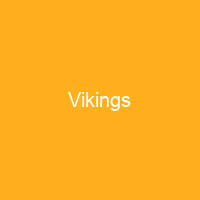Vikings

Vikings were the seafaring Norse people from southern Scandinavia. They raided, pirated, traded and settled throughout parts of Europe. A romanticised picture of Vikings as noble savages began to emerge in the 18th century. The etymology of ‘viking’ is uncertain.
About Vikings in brief
 Vikings were the seafaring Norse people from southern Scandinavia. They raided, pirated, traded and settled throughout parts of Europe, and explored westward to Iceland, Greenland, and Vinland. The Vikings had a profound impact on the early medieval history of Scandinavia, the British Isles, France, Estonia, Kievan Rus’ and Sicily. Popular conceptions of the Vikings often strongly differ from the complex, advanced civilisation of the Norsemen that emerges from archaeology and historical sources. A romanticised picture of Vikings as noble savages began to emerge in the 18th century; this developed and became widely propagated during the 19th-century Viking revival. There is little indication of any negative connotation in the term before the end of the Viking Age. In the Middle Ages it came to mean Scandinavian pirate or raider, while other names such as \”heathens\” or ‘Northmen’ were also used. The etymology of ‘viking’ is uncertain. Various theories have been offered that the word may be derived from the name of the historical Norwegian district of Víkin, meaning ‘creek, inlet, small bay’ In addition, people from the Viken area were not called ‘Viking’ in Old Norse manuscripts, but are referred to as víkverir,. In the masculine explanation that could explain only the masculine, not the feminine is a serious problem because the masculine is easily easily gained from the feminine.
Vikings were the seafaring Norse people from southern Scandinavia. They raided, pirated, traded and settled throughout parts of Europe, and explored westward to Iceland, Greenland, and Vinland. The Vikings had a profound impact on the early medieval history of Scandinavia, the British Isles, France, Estonia, Kievan Rus’ and Sicily. Popular conceptions of the Vikings often strongly differ from the complex, advanced civilisation of the Norsemen that emerges from archaeology and historical sources. A romanticised picture of Vikings as noble savages began to emerge in the 18th century; this developed and became widely propagated during the 19th-century Viking revival. There is little indication of any negative connotation in the term before the end of the Viking Age. In the Middle Ages it came to mean Scandinavian pirate or raider, while other names such as \”heathens\” or ‘Northmen’ were also used. The etymology of ‘viking’ is uncertain. Various theories have been offered that the word may be derived from the name of the historical Norwegian district of Víkin, meaning ‘creek, inlet, small bay’ In addition, people from the Viken area were not called ‘Viking’ in Old Norse manuscripts, but are referred to as víkverir,. In the masculine explanation that could explain only the masculine, not the feminine is a serious problem because the masculine is easily easily gained from the feminine.
This is found in the Proto-Nordic verb *wikan, ‘to turn’, similar to Old Norse ‘vík-to move’, as well as in the German verb *wîk, as in ‘to recede, recede’ This is in turn similar to the Old Norse verb to move, with the same root as’sea mile’, originally ‘the distance of two rowers’, or *weik or *wik, in Proto-Germanic *îk. The Gårdstånga Stone uses the phrase \”Þeʀ drængaʀ waʀu wiða unesiʀ i wikingu\”, referring to the stone’s dedicatees as Vikings. The stone of Tóki víking was raised in memory of a local man named Tók who got the name Towki vÍking, presumably because of his activities as a Viking. In Sweden there is a locality known since the Middle ages as Vikingstad. The Bro Stone was raised. in. memory of Assur who is said to have protected the land from Vikings. The Bro stone was raised to honor Assur, the man who protected Sweden from Vikings, and who died in battle in the 11th century. The name ‘Víking’ is also used as a personal name on some Swedish runestones. There is no evidence that the term ‘vikings’ was used in the early 20th century, but it is used to refer to people who lived in the area before then.
You want to know more about Vikings?
This page is based on the article Vikings published in Wikipedia (as of Jan. 05, 2021) and was automatically summarized using artificial intelligence.












